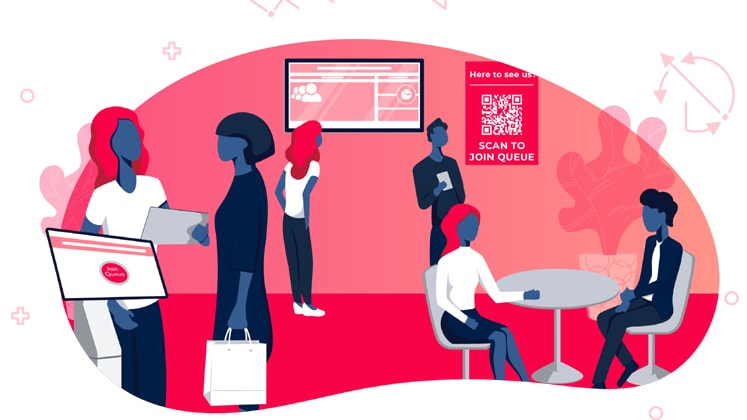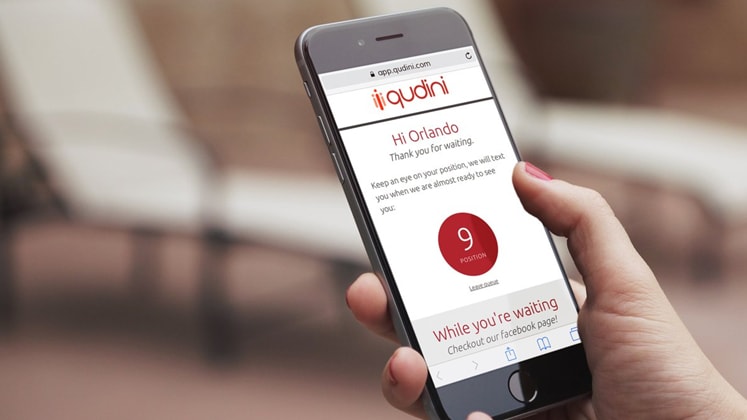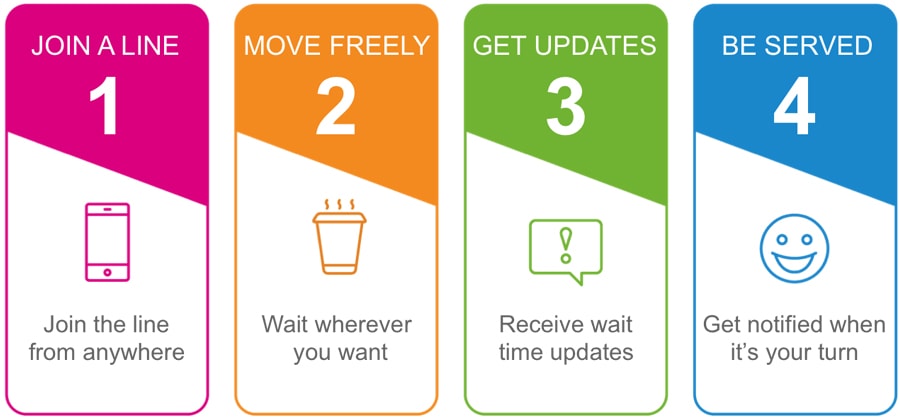Crowded stores and long checkout queues would be a thing of the past for quite some years to come, as the customers would prioritise social distancing and a safe environment to shop, thereby refraining themselves from entering the crowded stores and waiting lines. As we are entering the ‘new normal’, safe and healthy shopping environment has become the top necessity of the customers. Therefore, the need to manage the crowd in the store for limiting the number of people remains one of the most important aspects to be considered apart from providing a contactless experience.
Queue Management and Appointment Booking Technology is one of the potential solutions that can help retailers manage the number of people entering the store at a moment. As the customers would now be making more planned visits to stores, the solution of ‘appointment booking’ will help them to schedule their visits to the stores.
Qudini Virtual Queue Management
Qudini – a B2B SaaS provider of Retail Choreography solutions for Virtual Queue Management, Appointment Booking and Task Management – is helping retailers establish social distancing in the stores. The virtual queuing and scheduled store visits solution allows retailers to eliminate queues, manage the number of customers entering the store, therefore ensuring social distancing and offering an experience that customers feel confident to return.
The easy-to-use technology can be operated through a tablet, a kiosk or a smartphone. The customers entering the store are required to scan a QR code using their smartphones for which they have to install an app available on iOS and Android. Once scanned, the customers are prompted to enter their purpose of visit after which they enter the virtual queue and are notified of their position by an SMS and a live smartphone countdown (or even a TV display). The solution then automatically updates them as their turn draws near.
The store associates can use Qudini to manage customers from any desktop, tablet or smartphone device. The retailers get access to continuous insights on footfall patterns, customer interests, resource needs, feedback, etc. “We have native apps for iOS and Android and they can integrate with footfall counting tools, which updates automatically. Our software can stand alone, or easily integrate with a retailer’s existing ecosystem,” said Imogen Wethered, CEO and Co-Founder, Qudini.
Other key feature that the solution provides is appointment scheduling which helps in setting the capacity of customers and enabling customers to easily schedule time-slots to visit stores to browse or to have an in-person appointment. “The appointment booking solution is useful for setting your store capacity according to social distancing rules and enables customers to book their store visit time or in-person service by a host with a tablet at the store entrance door or from a contact centre or website,” said Imogen.
The solution can be integrated with any of the brand’s sales channels, including website, mobile app, search engine profile and online ads, social media pages, individual staff profile pages, QR code on physical ads and printed collaterals, Qudini self-service kiosk app, etc. The customers are required to select schedule visit, date and time on the app/website after which they receive a confirmation via SMS. Customers also receive constant reminder messages of their appointment details by SMSes, e-mails and personal calendar links. This software is also useful for retailers wanting to offer appointments for in-store services.
Using the solution, the customers can also choose ‘click and collect’ option for scheduling their visit to the store for collecting their orders. One of Qudini’s prospective customers is Brown Thomas, a luxury departmental store, which deployed the Qudini Appointment Scheduling software to improve its appointment booking experience and drive footfall. With this installation, the retailer has witnessed an increase of 13 per cent in appointments; 78 per cent of its customers with appointment make purchase, while 50 per cent in appointment have booked online through organic traffic.
Qless personal wait time forecast
Another technology solution is QLess, based in the USA, which is a provider of Queue Management and Appointment Scheduling Solution. The software provides customers a personal wait time forecast and notifies them as they move to the front of the queue. The QLess app that can be downloaded into the cell phones of the customers allows them to pre-plan their visit to the store.
Customers can join a virtual queue using the app or the company’s website from wherever they are. Once in the queue, alerts are sent directly to their cell phones. The notifications let them know their place in line and how long the approximate wait time is. As they move up in the queue, they are updated and even asked if they need a little more time. When it is their turn for service, the app directs them to the correct location or service desk. A company’s employees can also send direct messages to customers if needed. The system effectively reduces customer wait time and helps employees manage individual customers.
For the retailers, a real-time dashboard captures pre-visit data so that the staff of the store is better prepared to serve the customers. The retailers can also receive quick feedback on the customer app after each transaction that lets them improve their services. The installation of the QLess system does not require any special hardware. It can work with all the major web browsers and on the mobile phones of the customers.
The employees can be trained virtually that can be easily completed and understood in 2 hours. They also have access to a real-time dashboard where they can manage customers and their needs. Retailers get a full report and graph about the business metrics, transaction types and times, and satisfaction surveys. Hence, one can gauge how well the system is working and where improvements can be made in one’s business operations.
Helping build better trust in offline shopping
The need for social distancing has increased the acceptance of online shopping within the people of different age groups. To ensure that the offline retailers remain afloat, they need to think of re-strategising their business models and have to rely on technology to help them combat the challenges.
The customers would now also prefer a healthy and safe environment to shop. Therefore, it is essential for the retailers to have technologies that would help them better manage the crowd. The technology can help customers refrain themselves from crowded places, schedule their private visits and even choose to pick up their orders with its use. Moreover, since the notifications are being sent on the mobile phones, the customers no longer need to stand near the store and can wait in their cars or respective vehicles.
“We believe we will see a greater blend of digital and physical shopping channels which will change consumer omnichannel shopping behaviour in the long-term. Higher omnichannel customer behaviour is a good thing for a brand, and the coronavirus outbreak could act as a catalyst for greater multi-dimensional retail offerings in the future. Coronavirus isn’t going away soon, and so, businesses need to adapt to this ‘new normal’, and those who do so the fastest, will win out,” concluded Imogen.
Also Read: TextileGenesis: Combating counterfeits with blockchain









